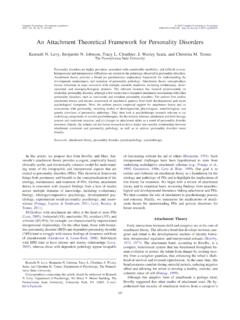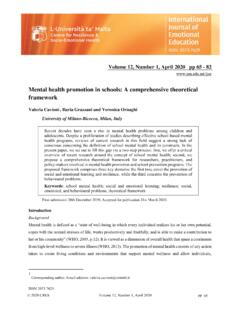Transcription of Theoretical Framework Interpretivism West
1 Running Head: Interpretivism IN EDUCATION 1 Interpretivism in Education: An Overview Rachel West University of the Pacific Interpretivism IN EDUCATION 2 Interpretivism in Education: An Overview As educational researchers struggle with the ramifications and possibilities of their research, aligning research projects with accepted theories in the field is one way to focus the lens on results and allow for better understanding of findings and implications. The Theoretical Framework of Interpretivism is one such lens. While it has become the name for an umbrella Framework for other theories within a paradigm that seeks understanding, Interpretivism is also a commonly used way to conduct educational research. What is it and Where Did it Come From? The use of Interpretivism in education can be tracked back to the late 1970s, though it has been used in the areas of anthropology, sociology and philosophy for much longer (Taylor & Medina, 2013).
2 Its overarching belief is that to understand this world of meaning one must interpret it (Schwandt, 1994, p. 118). The theory became more prevalent as social scientists refuted the ideology that the aims and methods of the social sciences are identical to those of the natural sciences (Schwandt, 1994, p. 119). The aim of anthropology to understand other cultures from the inside strongly influenced the use of interpretive ideals; being able to immerse into a culture to understand a culture correlated strongly to groups in education, and allowed for researchers to build rich local understandings of the life-world experiences of teachers and students (Taylor & Medina, 2013, para. 8). This was a shift away from the paradigm of positivism and usage of scientific methods that dominated the areas of research, thus allowing researchers to focus on people rather than methods. The ultimate goal of Interpretivism is to understand individual experiences, with the belief that reality is subjective and constructed by the individual (Lather, 2006).
3 The focus is always on the experience of the participants, and the methods are not as important as they might Interpretivism IN EDUCATION 3 be to more naturalistic and positivist ( traditional scientific) researchers (Schwandt, 1994). The theory values individual experiences, and gathers data through participant observation, interviewing and analyzing documents (Lather, 2005). The move toward the idea that different representations of constructions lead to different outcomes or products, different ways of expressing experience, (Lincoln & Guba, 2013, p. 48) has allowed for more flexibility within research methods and expectations of outcomes. Therefore, there is not a focus on methods, rather, all interpretive researchers watch, listen, record and examine (Schwandt, 1994, p. 119) in some way, and the choice is based on the researcher s purpose. Ultimately, the people living the experiences construct their own realities, and Interpretivism seeks to understand those differing constructions, without looking at numbers or surveys, or assuming that all people have had the same experiences.
4 Strengths and Benefits While it seems obvious that Interpretivism would be a helpful lens with which to view any world, in education, interpretive inquiry engages teachers as reflective practitioners in developing enhanced constantly asking questions such as: Who are these students who sit before me? Who is the self that teaches? (Taylor & Medina, 2013, para. 12). These types of questions should cause reflective teaching and learning practices in all facets of education. It is also important to note that, just because interpretive researchers look at individual experiences, it does not mean that issues of social justice or the political and economic nature of education are ignored; it simply means the researcher must put them in context. It seems important to note that this theory works well for education because, unlike postivism, it comes from the understanding that not everything can be boiled down to numbers and statistics when working with people, either individually or in groups.
5 This theory also works Interpretivism IN EDUCATION 4 well because it is not attempting to change the system or emancipate a group; often, interpretivist inquiry seems to be an attempt to understand different social constructions so that someone, somewhere, can then understand the area/topic being addressed. It appears to be a common starting point for further research, and many studies begin with simply understanding. Criticisms and Concerns Interpretive data collection takes many forms; ethnography, participant observation and interviews, to name a few (Lather, 2005; Lincoln & Guba, 2013; Schwandt, 1994). Because of this, a major area of contention with this theory is that researchers may somehow taint the data collection process or not be able to draw the line between investigation and investigator (Schwandt, 1994, p. 119). Conversely, another major criticism of the theory is that because interpretive researchers are warned not to become too involved or engaged in their studies (as in traditional ethnography), they thus, cannot engage in an explicitly critical evaluation of the social reality they seek to portray (Schwandt, 1994, p.)
6 131). Side by side, these arguments present a real dilemma: interpretive researchers are either too involved with their participants lives, or they are outsiders who can t ever truly understand. This is an interesting conundrum, but despite these two arguments, to be a good interpretive researcher, individuals must be comfortable with the blurring of lines between the science and art of interpretation, (Schwandt, 1994, p. 131) without ignoring or disregarding the lived experiences of inquirer or respondents into the anonymous field of discourse (Schwandt, 1994, p. 131). These concerns reflect ongoing concerns within the field of insider versus outsider : which is the researcher, and are they merely observing the participants, or are they a participant themselves? In his review of the extensive literature surrounding this topic, Labaree (2002) found that: Interpretivism IN EDUCATION 5 Insiderness does hold value for the researcher due to possession of previous knowledge that informs multiple points of access to informants and provides a head-start in interpreting the meaning of organization s language and the unsaid and unmarked features of a community s culture and belief However, these advantages are not absolute.
7 (p. 116) It appears that there remain two sides to the issue, and it is up to the researcher to determine where they feel most comfortable. A major concern of mine with this theory initially was the potential lack of action. While I relate strongly to the idea of using interpretive inquiry to guide my own research, I was concerned with the idea that interpretations from research within this theory are not designed to cause change. The initial paradigm shift to Interpretivism has now further shifted into critical theory and other emancipation theories ( feminism, critical race theory, etc.) and if I choose to affect change through my research, a critical Framework will be a better fit. However, it seemed that ethnographies and Hermenuetic circles are designed to that knowledge should then be put to the test and used. Fortunately, Schwandt spoke to my concerns around the issue of action when he posited that Interpretive accounts are to be judged on the pragmatic grounds of whether they are useful, fitting, generative of further inquiry, and so forth (1994, p.)
8 130). I was then further reassured that the idea of taking knowledge of people s realities and assigning usefulness or relevance for further research can fulfill an element of action because of Lincoln and Guba s (2013) belief that the individual constructions made in each person s life can give rise to creative and innovative formulations that extend or human thought and appreciation, or, additionally, extend social justice (Lincoln & Guba, 2013, p. 48). Finally, Tedlock s (2005) assessment that ethnography is public, and straddles the domains of lived experience and Interpretivism IN EDUCATION 6 recollected memory of time spent interacting in the field, on one hand, with time spent alone in reflection, interpretation, and analysis, on the creates a location within which new possibilities for describing and changing the world co-occur ( ) allowed me to understand the bigger and broader potential that ethnography has. These prolific interpretivist authors all make strong arguments for the possibilities of action within the Framework and I am reassured that I may cause change within the Framework , but only time will tell if it will work for me on a personal level.
9 Interpreting Early College Student Data My specific research interest focuses on the socialization of students enrolled in Early College High Schools. I used a variety of literature to review; though there is not a lot of literature specifically speaking to my topic, much of what I found used Interpretivism as a theory. It seems that because the research on this topic is relatively new, there is little critical theory ( call to emancipate or make change) at this point; the research focuses mainly on quantitative and post-positivist methods and analysis, or interpretive data collected from participant observation and interview. A good representation of this theory in my topic area is Thompson and Ongaga s (2011) study of an Early College High School in North Carolina. They evaluated the program using Noddings ethics of care (p. 44) to interpret student reactions to the small learning community atmosphere of their school. This ethics of care focus provided a lens with which to interpret student responses about whether students felt cared for, and if they were invested in their school community.
10 Though not directly stated as an interpretivist Theoretical Framework , this article is representative of the literature in this area, as it made meaning by focusing on the lived experiences of individual students and their relationships on campus. The study s focus on a Interpretivism IN EDUCATION 7 single school and the relationships between students and teachers illustrates the idea above by Taylor and Medina (2013): Interpretivism allows educators to identify Who are these students who sit before me? Who is the self that teaches? (para. 12). Thompson and Ongaga (2011) found that, at the particular school in the study, students felt cared for and the constructed realities they all live in had characteristics in common. My current study design is focused on understanding the experiences of recently graduated early college high school students. This theory seems a good fit for this relatively new area of education research, because it will allow for student voices.






